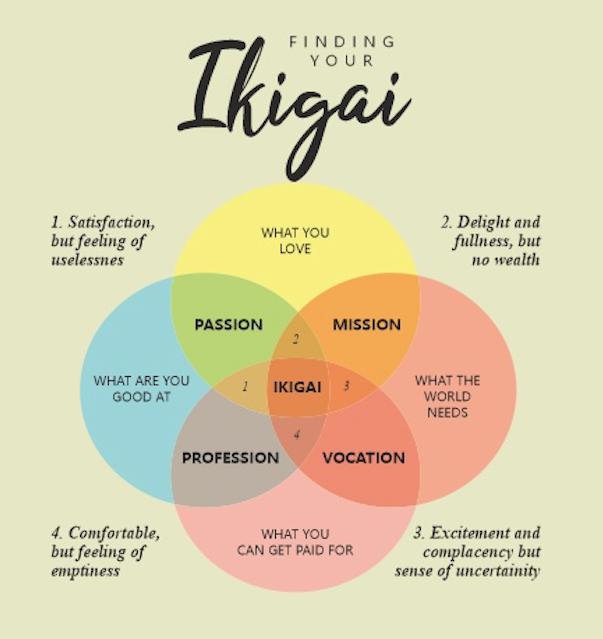From the stoics to the sentimentalists, most have one question in common: What is the meaning of it all?
Searching for purpose and meaning helps us come up with a reason for living. As Aristotle always said, our ability to reason is what makes us different to other animals. This sits at the core of Ikigai, the Japanese concept that speaks to our lives’ direction, purpose, and meaning.
Quite literally, iki means “to live”, and gai means “reason”.
Ikigai = reason to live
It’s a beautifully simple idea that becomes increasingly complex as we investigate precisely what motivates us, guides our passions and helps us make a difference within our communities. In the Western systems of life, we often follow the expected path that is conditioned into us through our education. We don’t get to ask ourselves why, and more importantly, we don’t always have the structure to know how to deeply interrogate our lives to know what will lead to fulfilment.
Ikigai offers us this structure.

Ikigai is a systematic and cyclic way to explore the abstract concepts of satisfaction, delight, fullness, comfort, excitement and wealth.
The four entry questions we can ask ourselves are:
- What do I love doing?
- What am I good at?
- What does my community need?
- What can I get paid for?
For many of us, we only really ask the fourth question even though our colleges, universities and trade schools try to answer the others. But sometimes, it’s not the answers we need, but the permission to ask the questions.
Yuval Harari said that questions we can’t answer are far better for us than answers we can’t question. All the wealth in the world cannot help provide delight, excitement and fulfilment if we aren’t able to ask ourselves what we love doing, what we’re good at and discover what our community needs.
This is where we can begin to define and differentiate our passion from our mission, our profession from our vocation and see how we can integrate them all for a purpose and reason to live.
This integration enables us to dive deeper into our life and financial planning, giving us key pointers and motivations for our decision-making and helping us communicate with our loved ones. We can decide what is truly important to us and why!
They say that if we want to know what we truly value, we must look at where we spend our money. If this aligns with our Ikigai, then we know we’re creating a healthy structure for a meaningful life.

